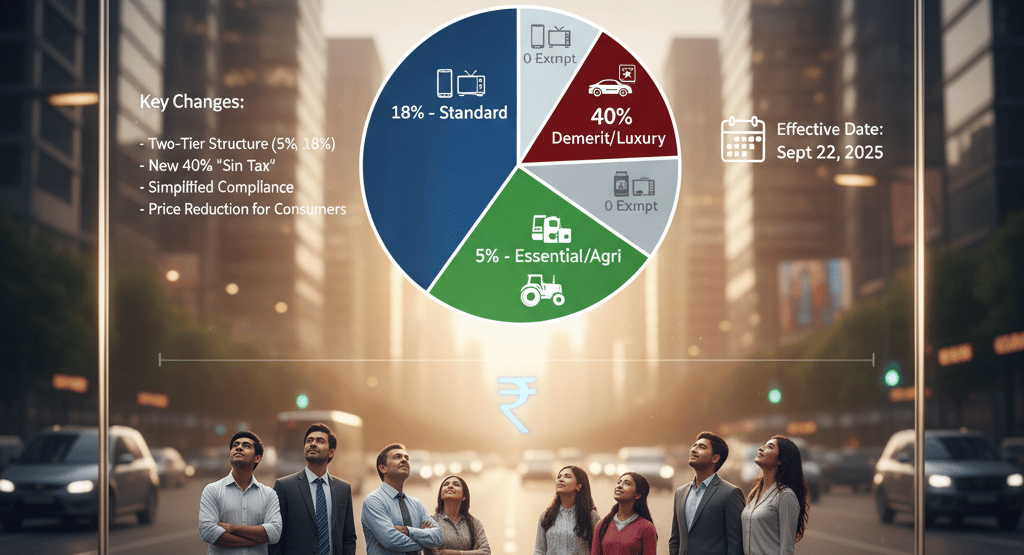India Announces Landmark GST Overhaul: New Two-Tier Rate Structure to Roll Out from September 2025
India Announces Landmark GST Overhaul: New Two-Tier Rate Structure to Roll Out from September 2025
FINANCIAL TOOLSLOANSINSURANCESHAREMARKET
Online Finance Market
9/10/20253 min read
India Announces Landmark GST Overhaul: New Two-Tier Rate Structure to Roll Out from September 2025
New Delhi, India - In a significant move aimed at simplifying the tax regime and boosting consumption, the Goods and Services Tax (GST) Council has announced a major overhaul of the existing GST structure. The new rates, slated to be effective from September 22, 2025, will see the consolidation of the current four main slabs into a two-tier system. This landmark decision, taken at the 56th GST Council meeting, is expected to have a far-reaching impact on households and various sectors of the Indian economy.
Under the revised framework, the prevailing GST rates of 5%, 12%, 18%, and 28% will be replaced by a standard rate of 18% and a lower rate of 5%. Furthermore, a new 40% 'demerit' or 'sin' rate will be levied on select luxury and demerit goods. Several essential items will also be exempt from GST, falling under the 0% slab. This restructuring aims to reduce tax complexities, enhance compliance, and make a wide array of goods and services more affordable for the common person.
Here is a detailed breakdown of the new GST rates, categorized by major headings:
Household and Everyday Essentials (5% and 0%)
In a significant relief for households, a majority of daily consumption goods have been placed in the lower 5% tax bracket, with many essential food items now being tax-free.
Moved to 5% from 12% or 18%:
Food Items: Packaged food items, butter, ghee, cheese, almonds, fruit juice, processed and ready-to-eat vegetables, pickles, jams, jellies, and packed coconut water.
Personal Care: Hair oil, toothpaste, soaps, and shampoos.
Other Essentials: Umbrellas and kitchenware.
Exempted from GST (0%):
Dairy Products: Ultra-High Temperature (UHT) milk and pre-packaged and labelled paneer (chena).
Staples: Indian breads like roti and chapati.
Electronics and Consumer Durables (18%)
The consumer electronics and durables sector is set to witness a significant price correction as most items in this category will now attract a uniform GST rate of 18%, down from the earlier 28%.
Key Items Moved to 18%:
Televisions (including LED and LCD)
Refrigerators
Washing machines
Air conditioners
Dishwashers
Monitors and projectors
Automobiles (Revised GST Rates)
The automobile sector will see a mixed bag of rate changes, with smaller vehicles becoming more affordable.
18% GST:
Small cars (petrol engines up to 1200cc and diesel engines up to 1500cc, with a length not exceeding 4 meters).
Motorcycles with an engine capacity of up to 350cc.
Commercial vehicles, including trucks and buses.
Three-wheelers.
Auto parts will now have a uniform rate of 18%.
40% GST (Demerit Goods):
Luxury cars and premium motorcycles (engine capacity above 350cc) will fall under the new 40% tax slab.
Agriculture and Farming Equipment (5%GST)
To support the agricultural sector, the GST Council has rationalized the tax rates on various farming equipment and inputs.
Moved to 5% from 12%:
Tractors
Agricultural, horticultural, and forestry machinery for soil preparation and cultivation.
Harvesting and threshing machinery.
Sprinklers and drip irrigation systems.
Healthcare and Education (0% and 5%)
In a move to make healthcare and education more accessible, several items have seen a significant reduction in their GST rates.
Healthcare:
0% GST: A number of life-saving drugs have been made exempt from GST.
5% GST: Diagnostic kits, reagents, glucometers, and other medical devices.
Education:
0% GST: Exercise books, notebooks, pencils, sharpeners, maps, and globes.
Services Sector (Revised GST Rates)
The services sector will also witness a rationalization of tax rates.
5% GST:
Hotel accommodation with a tariff of up to ₹7,500 per day.
18% GST:
Most other services will fall under the standard 18% rate.
'Sin' or Demerit Goods (40%)
A new higher tax slab has been introduced for goods considered to be demerit or 'sin' goods.
Items under the 40% bracket:
Pan masala, gutkha, and other tobacco products (existing cess will also continue for some time).
Aerated drinks and other sugary beverages.
Luxury cars and premium motorcycles.
This comprehensive restructuring of the GST regime is a pivotal moment for India's indirect tax system. The government anticipates that these changes will not only provide significant relief to consumers but also foster a more transparent and efficient tax environment, thereby contributing to the overall economic growth of the nation. Businesses are expected to pass on the benefits of the reduced tax rates to the end consumers, leading to a potential decrease in the prices of a wide range of goods and services from September 2025.

Online Finance Market
Your source for loans, insurance, Deposit and Investment, Stock Market .
Support
Links
contact@onlinefinancemarket.com
© 2025. All rights reserved.

